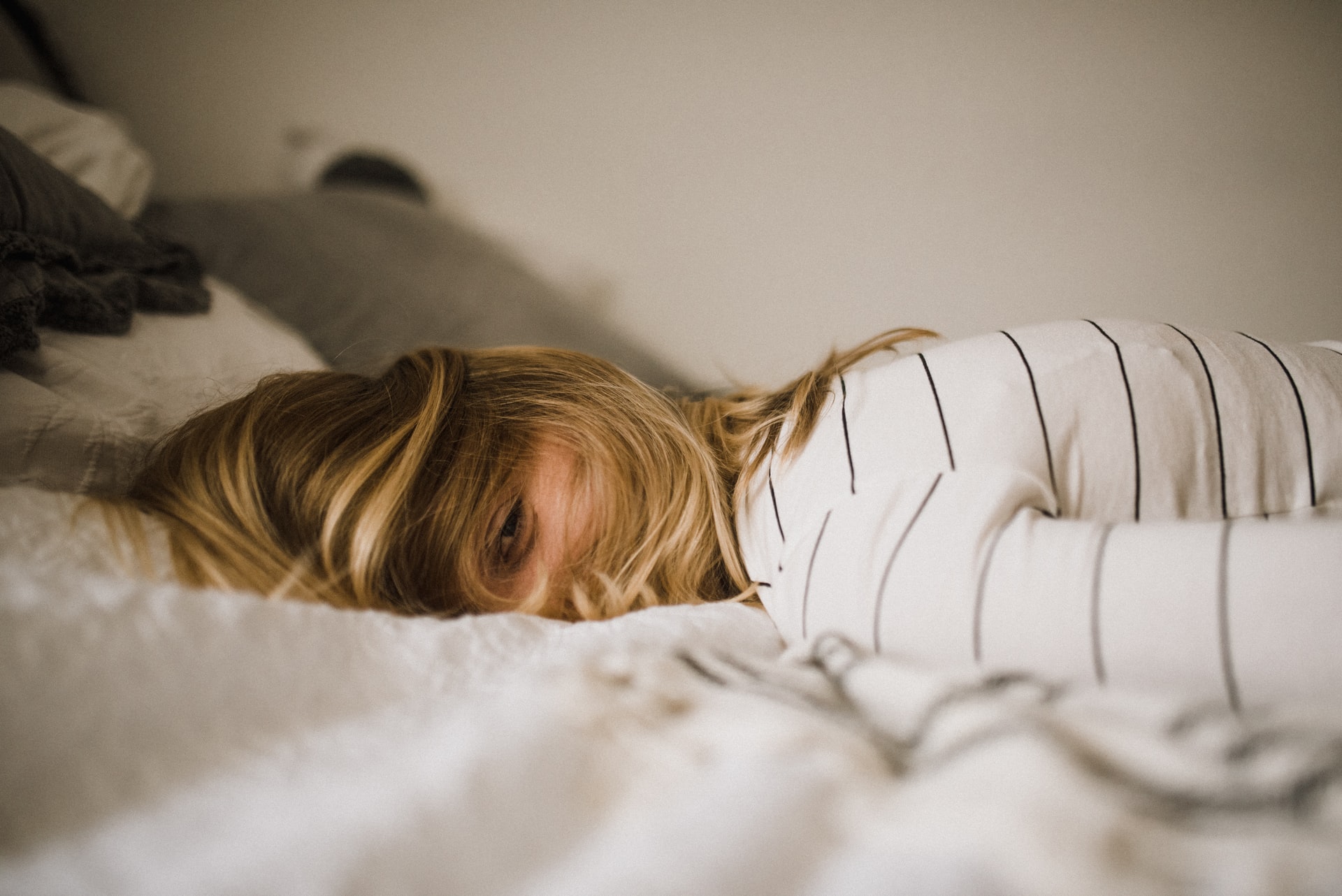Calm Your Mind: 10 Tips and Relaxation Techniques for Better Sleep
We all know that sleep is essential to our overall health and well-being. Unfortunately, many of us take it for granted, making it almost an afterthought to our screen-obsessed society. In fact, according to the 2019 Philips Global Survey, only 10% of adults worldwide report sleeping extremely well, and 80% want to improve their sleep quality.
Lack of sleep and your mental health
Another sad part of being sleep deprived is that it doesn’t just make you look and feel tired the next day. It can negatively affect your concentration and cognitive performance and lead to increased irritability, anger, and aggression. Lack of sleep can also lead to behavior changes or increased negative emotional responses to stress.
Here are the other ways (ongoing) sleep deprivation affects your mental health:
- It can worsen existing symptoms of certain mental health conditions.
- A 2018 review of studies said it can contribute to the development of temporary psychotic symptoms (hallucinations and delusions).
- It can contribute to the development (worsening and maintenance) of several mental health disorders (anxiety, depression, bipolar disorder, post-traumatic stress disorder or PTSD, suicidal ideation, etc.).
Tips for a good night sleep
If you have poor sleep quality and feel anxious or depressed, seeing a medical or mental health professional is advisable. You can also look into your sleep habits and environment, or whether you’re having too much stimulation before bedtime. Making changes in your habits, routines, and environment can help.
Here are some tips for good sleep and calming your anxious mind before dozing off.
Keep a consistent sleep schedule
This simply means sleeping and waking at or around the same time, including weekends. Just make sure you get the recommended seven to nine hours of sleep each night. It is also worth noting that sticking to a sleep schedule helps maintain and reinforce your internal clock or body’s sleep-wake cycle.
While getting enough sleep is important, having inconsistent sleep schedules can result in bigger health issues. According to an article from NIH MedlinePlus, it can negatively affect your metabolism, as well as put you at increased risk of chronic diseases. Those with irregular bedtime also don’t feel as rested as people with regular sleeping schedules.
Below are a few tips on getting your sleep schedule on track:
- Go slow in adjusting your bedtime.
- Limit or avoid exposure to light before bedtime.
- Avoid working out too close to bedtime.
- Avoid afternoon naps (it can make it hard for you to fall asleep earlier).
- Get sunlight exposure, which helps set your internal clock for the whole day.
Create a relaxing sleep environment
A restful bedroom is cool, dark, and quiet. Light exposure, especially close to bedtime, can create difficulties in falling asleep. This is why you should avoid too much use of electronic devices close to your sleeping time. Another helpful tip for a good night’s sleep is removing TVs, computers, and similar devices from the bedroom
It is also wise to consider room-darkening curtains or shades, a white noise machine, and other devices that create the right environment. Here are a few other tips that can make your bedroom conducive to sleep:
- Keep your room tidy; eliminate clutter.
- Use the right bedding with fabrics that feel nice against your skin.
- Make sure that your mattress is comfortable. Replace it if it is worn out.
- Find the right pillows that work for you.
- Wash your bedding and pillow cases regularly.
- Pick soothing or calming colors for your bedroom.
Establish a bedtime routine
Following a set of habits before dozing off is one helpful tip for good sleep. It sends a message to your brain that it’s time to sleep, allowing you to wind down and relax to fall asleep. Nighttime routines, furthermore, are said to help fight stress and reduce symptoms of anxiety.
- Dim your lights.
- Turn off all electronic devices
- Drink a soothing beverage, like chamomile tea or warm milk.
- Make a bedtime playlist.
- Take a warm bath or shower an hour or two before bedtime.
- Read a good, lighthearted book.
- Practice meditation or relaxation techniques for sleeping.
- Change into your sleepwear.
- Write down your worries for the next day.
Practice meditation
If you’re looking for relaxation techniques for anxiety before bedtime, meditation can help. In fact, a 2014 clinical trial found that mindfulness meditation is a viable option for treating chronic insomnia in adults. It can also induce a relaxation response in the body, triggering the release of melatonin, a hormone that helps promote sleep, a 2018 study says.
When meditating before bed, make sure you set the right environment. It should be cool, calm, quiet, and free of clutter and other distractions. Your meditation could be as simple as sitting quietly for a few minutes and concentrating on your breathing. You can also try and find other meditation methods that work for you.
Some of the most popular meditation methods include:
- Guided meditation – this involves listening to an audio or recorded clip of someone guiding you through the process and explaining the breathing exercises, relaxation techniques, and others. This is ideal if you’re having difficulties keeping your mind focused on relaxing.
- Mindfulness meditation – it combines both mindfulness and meditation and involves focusing on your thoughts as they come through your mind. You don’t get caught up with those thoughts and sensations, but acknowledge and move past them. Mindfulness-based therapy, according to a study, can help treat stress, anxiety, and depression.
- Concentration or focused meditation – this involves focusing your attention on a certain object, sensation, or subject. It starts with selecting something to focus on (physical, aural, mental, or visual) and then observing what you see and relaxing your mind.
Try other relaxation techniques
While meditation is an effective relaxation technique for sleep anxiety, there are also other approaches that can help calm your brain. These include:
- Breathing exercises – Take slow deep breaths (in through your nose and out through your mouth). You can also try closing your eyes and breathing slowly in and out for a few minutes and focusing on your breath.
- Progressive muscle relaxation (PMR) – This starts with taking a few gentle breaths and tensing a group of muscles (focusing on a single area at a time), as you breathe. You then release the tension as you exhale. A 2014 study found it to be effective in reducing anxiety, while more recent research found it helpful in reducing symptoms of stress, depression, and anxiety.
- Body scan – This is a type of guided meditation that involves focusing your attention on different areas of the body. It involves noticing and scanning parts of the body for sensations and directing your deep breaths to that area, and visualizing it leaving your body.
Try paradoxical intention
If you experience performance anxiety about falling asleep, paradoxical intention might help. This is a behavioral technique that requires you to try staying awake as hard as you can, instead of forcing yourself to sleep. Paradoxical intention is said to be an effective intervention for insomnia and reducing sleep difficulties, a 2021 research concluded.
Deliberately fighting the effort to fall asleep can help you let go of your worries and help you relax and eventually doze off. When practicing this technique, just make sure not to engage in other mentally stimulating activities. It can also be done with other therapy strategies and by working with a mental health professional.
Engage in regular physical activity daily
Apart from boosting your mood and increasing your energy levels, regular exercise can also help improve your sleep quality. It decreases your cortisol (stress hormone) levels and releases endorphins, or feel-good hormones. This can help mitigate the symptoms of anxiety and depression and improve sleep quality, a study suggests.
Here are some exercise tips that can help improve your sleep:
- Engage in a 30-minute moderate exercise daily. It could be as simple as taking a walk and considering increasing the intensity if you can do so.
- Try different routines to find what’s best for you. Just make sure that the workouts you are considering match your fitness level. Be consistent but don’t overdo it.
- Consider a fitness tracker to monitor your movement and increase your motivation to exercise daily. It is also good to know that many devices today also help track your sleep. This can give you data about your sleep cycle and patterns, which is beneficial in optimizing your physical activity.
- If you can’t exercise in the morning, you can do so in the afternoon or evening. Just make sure to avoid intense or vigorous routines one to two hours before bedtime. If you want to exercise at night, stick to light to moderate routines.
Fight negative thoughts before bed
As you go to bed with the intention to relax and sleep, it is also the time when your thoughts turn negative, and remember some of your regretful and embarrassing moments. This can then prevent you from dozing off, as well as worsen the negativity they produce if you don’t get enough sleep.
Simply motivating yourself to think the other way around is not going to cut it, especially if you gravitate towards negative thinking and overthinking. Practicing positive self-talk daily and relaxing techniques for sleep help, as well as working with a mental health professional. They can use different therapy techniques (like CBT) to identify, challenge, and shift your negative thoughts.
Mind what you eat and drink at night
What and when you consume in the evening can negatively affect your ability to fall asleep and have a quality slumber. While it is not advisable to go to bed hungry, you shouldn’t also be stuffed or full. One helpful tip for a good night’s sleep is to avoid heavy meals a few hours before bedtime to allow your body to digest what you ate and not disrupt your sleep. Other helpful tips include:
- Avoid alcohol; it disrupts sleep and increases the symptoms of snoring and sleep apnea.
- Don’t consume caffeine late in the day, as it is a stimulant that may prevent your body from relaxing. A study suggests that drinking caffeine 6 hours before bedtime leads to significantly compromised sleep quality.
- If you need to eat at night, stick with a light snack like walnuts or fruits, such as cherries and bananas. Make sure to avoid citrus fruits, fried foods, spicy foods, and chocolate.
- Reduce your fluid intake before going to bed. Drinking large amounts of liquid before bedtime increases your risk of waking up because you need to use the bathroom. This can disrupt your sleep or make it hard for you to fall back asleep.
Consider therapy
As previously mentioned, sleep issues and related disorders can negatively affect your mental health and overall well-being. Therapy can be helpful in such cases, especially if you’re struggling to make healthy lifestyle changes or are dealing with sleep anxiety and other mood disorders.
If you’re looking for relaxation techniques for sleep anxiety, psychotherapy like cognitive behavioral therapy (CBT) can help. In fact, there is a type of CBT especially developed for sleep disorders. This is called Cognitive behavioral therapy for insomnia (CBT-I or CBTI). This is an evidence-based short-term approach to combatting insomnia.
CBT-I has five key components. These include:
- Sleep restriction
- Stimulus control
- Sleep hygiene
- Cognitive therapy/restructuring
- Relaxation technique/ training
The American College of Physicians (ACP) recommends CBT-I as the first-line treatment for chronic insomnia in adults. A 2004 clinical trial also found CBT-I to be more effective than medications in some patients.
Regular CBT can also work for sleep disorders by addressing unhelpful thoughts and behavior patterns that can contribute to sleep issues. With CBT, you work with a therapist to identify, evaluate, and challenge the thoughts that are preventing you from getting quality sleep. They can also help you make changes in your habits using different behavioral techniques.
Get started with therapy now
Therapy can be done face-to-face or in the comfort of your home through online therapy. If you’re considering trying cognitive behavioral therapy or other types of psychotherapy online, here are our top three picks to help you get started.
- Calmerry – is an online therapy platform that provides affordable prices, responsive support, and vetted therapists that specialize in a range of issues. It offers unlimited text messages and video consultations.
- BetterHelp – is the largest online therapy platform worldwide. It has over 8,000 licensed mental health professionals with advanced degrees (Master’s or Doctorate) and mostly positive customer reviews. It offers text, audio, and live messaging.
- TalkSpace – is another online therapy platform that has become one of the most popular online providers, with celebrities as its spokespersons. It offers flexible plans and access to a range of therapists, as well as communication via text, video, or audio, and live sessions.
If you want to learn more about these online service providers, check out our review/comparison of the best online therapy platforms.
Make sleep a priority. If you’re finding it hard to fall asleep or stay asleep, see a medical professional to rule out a sleep disorder. You can also benefit from seeing a therapist or a counselor to see if your sleep issues are related to anxiety, depression, or other mental health conditions. They can also help you with stress management, especially if stress at work or with family is what’s keeping you awake.


